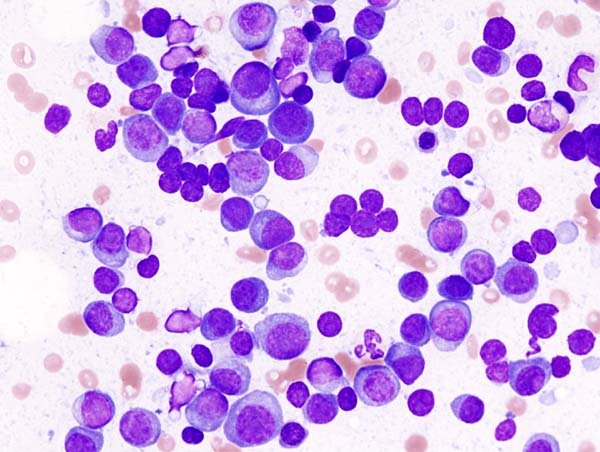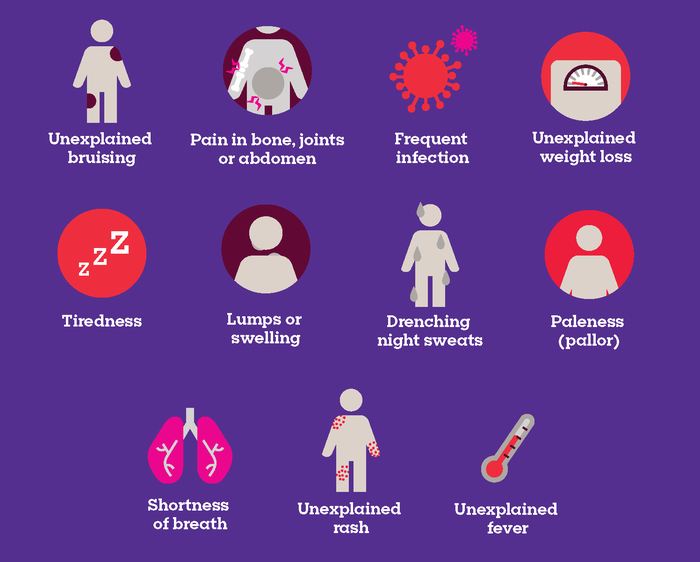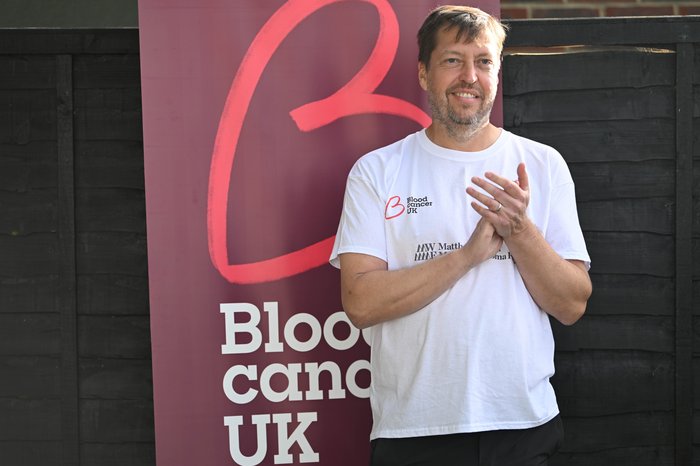What is myeloma? A type of blood cancer often mistaken for bone cancer
Myeloma, is often referred to as a “bone cancer” or “bone marrow cancer”, yet the more accurate term is “blood cancer”. We’ll explain what myeloma is, what causes myeloma, some of the signs and symptoms, and how we are working hard to beat it.
What is myeloma?
Myeloma is not technically a “bone marrow cancer”, it’s classified as a type of blood cancer. Myeloma starts in blood cells inside the bone marrow, the spongy material inside some of our bones. It can often damage the surrounding bones, which is why people sometimes call it bone marrow cancer or confuse it with bone cancer.

Myeloma cells under the microscope
What happens in myeloma?
In myeloma, something goes wrong with your plasma cells. Plasma cells are a type of white blood cell that form part of our immune system. Their job is to make antibodies to fight infection.
In myeloma, the plasma cells produce antibodies that don’t work properly. Antibodies are proteins that circulate in your blood, finding and killing germs such as viruses, bacteria and fungus which cause infections. This means someone with myeloma may get infections more often and have infections that last for longer.
Read more about what myeloma is and the different types of myeloma.
What causes myeloma?
We don’t fully understand what causes myeloma, but we do know that there are some things that make someone more likely to develop it. These are called risk factors. The main risk factors are your age (over 50), sex (male), family history (have a parent or sibling with myeloma), ethnicity (African-Caribbean background) and whether you have a condition called MGUS (a blood condition that can develop into myeloma in some people).
What are the symptoms of myeloma?
The signs and symptoms of myeloma are varied and hard to spot but the most common symptoms might include long-lasting infections, back pain or fatigue.
Myeloma can affect the way your bones renew and repair, making them weaker and more likely to break. This can cause bone pain, a symptom of myeloma. This is why many people mistakenly refer to myeloma as a bone cancer.
Read more about our symptoms of myeloma. If you have any symptom that you can’t explain, that goes on for a long time, or is unusual for you, speak to your GP.

What is it like living with myeloma?
Every year, nearly 6,000 people in the UK are diagnosed with myeloma. Myeloma is a treatable blood cancer, but it’s really tough knowing your cancer can come back over time.
We asked Joan, Louise, Ian, Cecilia and Craig who are all living myeloma what it’s like. Read more about what helps them cope.
If you have myeloma and are in need of support or information, you can contact our support team and speak to our incredible team of nurses.
How are Blood Cancer UK helping to beat myeloma?
This year we launched our Research Strategy for 2025-30, to will bring forward the day when no one dies of blood cancer or treatment side-effects. Over the next five years we are committed to funding at least £70 million of research into blood cancers, such as myeloma.

Matthew Wilson started the Multiple Myeloma Fund in 2022
The Matthew Wilson Multiple Myeloma Fund (MWMMF) was established in 2022 when Matthew Wilson joined forces with Blood Cancer UK in a mission to find a cure for myeloma.
So far, the fund has raised an incredible £6 million, supporting ground-breaking research focused on preventing, diagnosing and treating myeloma.
Read more about the Matthew Wilson Multiple Myeloma Fund and how you can support myeloma research.
Together we can beat blood cancers like myeloma
Myeloma is a blood cancer that is difficult to treat, but thanks to research progress is being made and survival rates are improving. People with myeloma are now living nearly twice as long on average as they were in 2005. New treatments continue to be developed that are bringing hope, giving people with myeloma longer and better lives.
Blood cancer is the fifth most common cancer. At Blood Cancer UK, we’re committed to bringing forward the day when no one dies from any blood cancer or its treatments.
Sign up to receive email updates
Direct to your inbox every month.
We will keep you updated about our work and the ways you can help, including campaigns and events. We promise to respect your privacy and we will never sell or swap your details.



